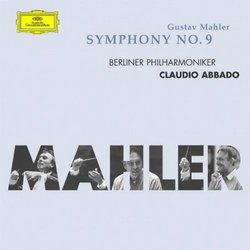| All Artists: Gustav Mahler, Claudio Abbado, Berliner Philharmoniker Title: Mahler: Symphony No. 9 Members Wishing: 0 Total Copies: 0 Label: Deutsche Grammophon Release Date: 6/11/2002 Genre: Classical Style: Symphonies Number of Discs: 1 SwapaCD Credits: 1 UPC: 028947162421 |
Search - Gustav Mahler, Claudio Abbado, Berliner Philharmoniker :: Mahler: Symphony No. 9
 | Gustav Mahler, Claudio Abbado, Berliner Philharmoniker Mahler: Symphony No. 9 Genre: Classical
|
Larger Image |
CD DetailsSimilarly Requested CDs
|
CD ReviewsLike An Opera Johnson Lee | Irvine, CA USA | 10/12/2005 (5 out of 5 stars) "Sometimes this symphony can sound like a one big funeral. I have to admit it can be very moving that way. Sometimes, however, I want to hear it as a well crafted piece of art and Abbado's version delivers just that. This is the performance that will never lose your interest from beginning to end. Thousands of different moods and emotions are clearly materialized as if one is hearing an opera with many characters and scenes. Abbado is very specific and descriptive. His players literally sigh, sneer, weep, and rejoice with the music. Characterizations of the woodwinds and brass are truly something to marvel at (example: the flute at the end of 2nd movt disappearing like a fairy). The new-born Berlin strings are still rich in tone but not as bottom-heavy as in Karajan era. You hear much more transparency than Karajan's or Bernstein's version. When this kind of sonic quality is combined with Abbado's obsessive emphasis on singing, the emotions of the tunes come out naked. I feel that EACH orchestra member, from the concertmaster to the back of the second violins, is truly playing their heart out instead of being driven by a conductor (you sometimes feel that way in many Mahler recordings). A very fresh performance indeed. It will spotlight many hidden aspects of this amazing work. By the way, this is the most well-recorded Mahler 9th I have ever heard. " Mature Mahler for a Lifetime tlyyra | Brooklyn, N.Y. USA | 07/19/2002 (5 out of 5 stars) "If Abbado's earlier set of Mahler symphonies (also on DG) already was worthy of special acclaim, these new valedictory recordings (including the third and seventh symphonies) only affirm the status of the departing music director of this great orchestra as the finest Mahlerian of our times. Over the years, Abbado's interpretations have become more spartan, pared down, crystallized to the essentials, less temperamental, and the effect is profoundly shattering. Never before have we heard this work laid out with such fundamental musicality, clear-headedness, and deep structural understanding of the composition's import. For those not blown away by Bernsteinian histrionics or Karajan's steely soundworld, the only competing modern interpretations are offered by Boulez, though these seem weaker in their emotional content in comparison. And with the superlative sound that lays out every detail for the ear and the mind to peruse, these are recordings that set the gold standard for Mahler performance, likely to last for a lifetime of listening. What a farewell indeed: a true last word of an intelligent artist at the peak of his powers, in full and sympathetic control of a perfect Mahler orchestra more nimble and alive than it has been for years. The only complaint comes for the packaging: typically again, the U.S. manufacturer omits the deluxe slipcase of the European version, going for lower production costs and cheaper looks. If you weren't lucky to catch the live performances, get all three issues but order them from Amazon.de." Great place to start (and even end??) R. Mathes | Cos Cob, CT, U.S.A. | 11/12/2007 (5 out of 5 stars) "Abbado shines in this great recording. It is tempting to say that this is not monumental and essential Mahler but I believe that is too easy and short sighted a comment. I have been a Mahler 9 fanatic for many years. I discovered it via the great Karajan recordings, both analog and digital but then grew to believe that Leonard Bernstein owned this piece (I'm not at all sure I don't still believe this).
Any lover of the 9th must seek out both the performance by, and documentary, of Bernstein conducting the work with the Vienna Philharmonic in March of 1971. All that said...... so many of the 9ths have issues. Karajan's versions are magnificent but somewhat hard and granite like at times and almost intractable if that makes any sense. Bernstein's four are essential but the NY Phil is a bit lackluster in the 60's and Bernstein did not live the piece like he did a few years later when he filmed it. The film with Vienna, as I mention above, is absolutely essential but the sound leaves something to be desired. The live Bernstein-Berlin is rightly considered timeless and, as some say, perhaps the greatest ever but, among other inconsistencies, the climax of the 4th movement (the entire symphony) is missing its main theme because the entire Trombone section somehow spaced out. The Bernstein-Concertgebouw, somewhat remarkable especially in the 1st movement, is so completely over the top at times that even a fan like myself has to throw up his hands. Haitink, Barbirolli, Walter, Sinopoli, Levine, Barenboim, and others all have their strong points but none of them quite match the intensity of both execution and perspective that Karajan and Bernstein bring to this music. THEN...... along comes this Abbado recording. It is beautifully played. It is beautifully conducted. Warm, powerful, intense and at turns heartbreakingly gorgeous in the first movement, this reading of Mahler's masterpiece doesn't miss one moment in the score. The 2nd movement is both charming and sardonic when it needs to be and the 3rd is just flawless and as ferocious as Bernstein ever was. This is a man who knows this music like the back of his hand. He also has the respect of this group of musicians, perhaps the greatest orchestra in the world. His earlier performance with the Vienna Philharmonic was fine and well considered but not even close to this in terms of intensity. I have every recording of this piece, have done a two piano reduction of the 1st movement and when people ask me what recording to begin with when discovering the 9th, I always recommend this. I then go on to say, "once you have Abbado/Berlin, then discover the first ever with Bruno Walter, then Barbirolli, Klemperer, Haitink, and the greats: Karajan and Bernstein. Go buy this. It is essential." |

 Track Listings (5) - Disc #1
Track Listings (5) - Disc #1








